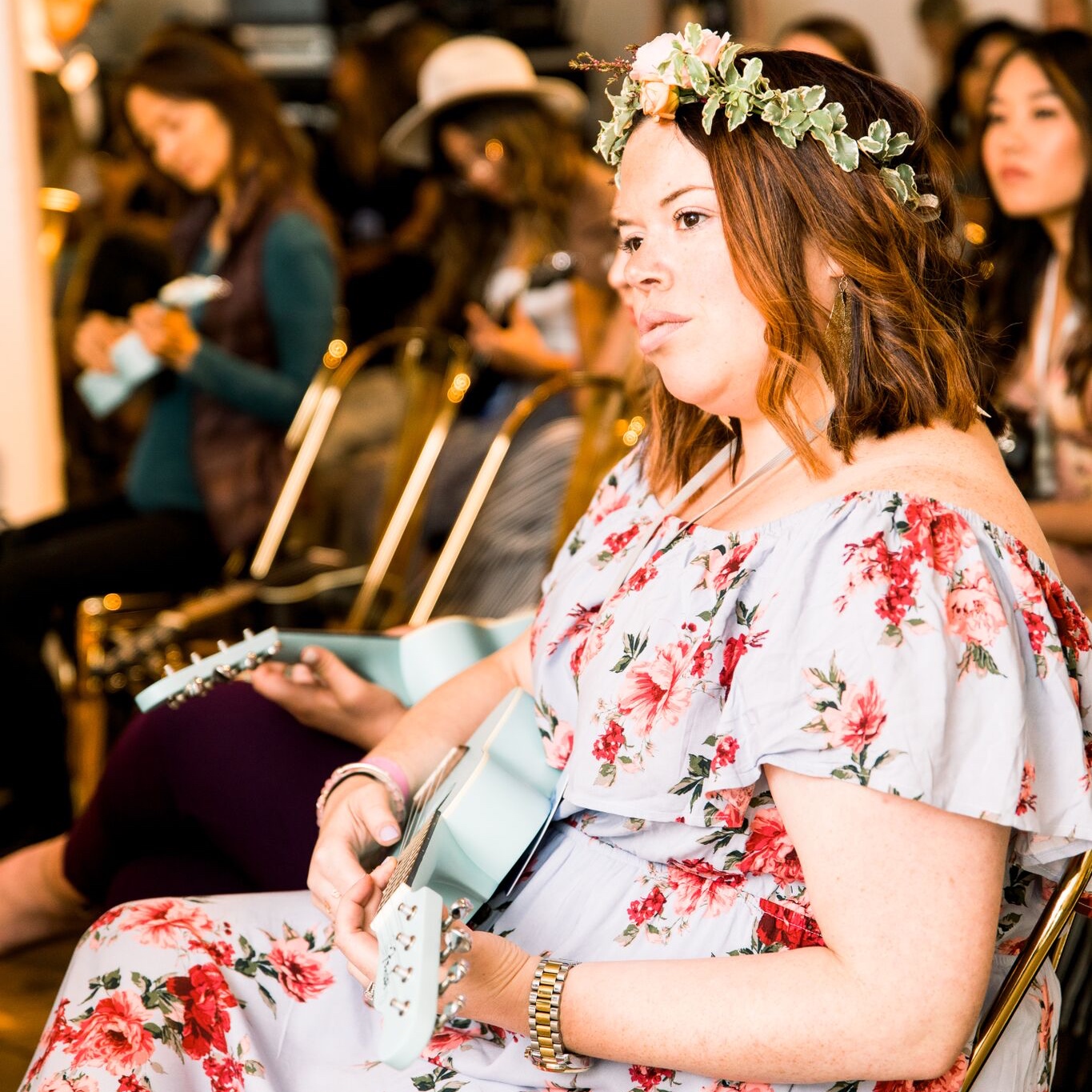Have you ever taken a moment to consider the power of music? According to research by the National Alliance of Mental Illness music therapy can benefit several mental health conditions including depression, trauma, and schizophrenia (just to name a few). Apparently, music acts as a medium for processing emotions, trauma, and grief but it can also be a calming agent for anxiety. That’s some powerful stuff, right?
Beyond music’s therapeutic abilities, just listening to music and playing instruments raises our overall happiness meter. We’ve all experienced those warm and fuzzy emotions when a nostalgic throwback song comes on the radio and we are instantly transported to another space in time. Music affects our sensory system more than we realize.
What if we told you that you could improve your mental health just by learning how to play a new instrument? You don’t even have to master it. Just learning how to read sheet music or attempting to play the chords can have the same positive impact. Oh, and from the comfort of your own home, or car, or desk—we aren’t joking!
Our friends at Fender have created an app known in the marketplace as Fender Play and we are in awe of its capabilities. This groundbreaking app teaches you how to play guitar, ukulele and bass, anywhere. Attendees at our Self Care Summit this year were some of the first to experience the app during the Fender Play ukulele class. But if you couldn't be there, we interviewed Fender Digital’s Director of Product, Mary Keenan to take a deep-dive on music therapy, how to play an instrument at the tap of an app, and so much more.
Follow along for some hard-hitting facts and deep insight on why music is something we all should embrace—for the betterness of our minds and bodies.
Create & Cultivate: What does your role entail at Fender? In what ways does your role touch Fender’s app, Fender Play? How long did it take to develop? Tell us everything!
Mary Keenan: “I oversee the curriculum and learning for Fender Play. I work closely with the other members of the product team to define the learning experience in the app. My team designs and writes each of the lessons used on Play and interacts with the production team to get it shot. We publish all of our content and, most importantly, provide support to users who are actively using the program. That helps us to shift our curriculum roadmap as we grow.
“We just celebrated our two-year anniversary. From initial germ of an idea to launch, it didn’t take us long to write and shoot the few hundred lessons we started with. However, we are expanding our content every day and have gone from hundreds to thousands today.”
C&C: Can you provide us with a rundown on the app? Why should people download it?
MK: “Fender Play is an online learning platform specifically for beginners. It’s designed to get you playing in minutes using a guided learning experience showing, step-by-step, how to get there. We bring players from the first step, how to hold the instrument, all the way through playing songs at an intermediate beginning level.
“Why download it? Because it works. We have over 17 thousand five-star reviews from users telling us this is the first time since trying to learn that they’ve really been able to play. That’s exciting to hear, but not really surprising. It’s because we approach learning a little differently than other programs.
“Our goal is to cater to busy lifestyles. Not only can you practice anywhere, anytime but Fender Play also helps you learn hundreds of skills with lessons averaging two to six minutes in length. Our videos are shot in very high-quality 4K, with clean and simple concepts presented one at a time. We break down what is a very overwhelming process into bite-sized, achievable steps. Anyone who has a goal of learning to play and gets motivated by quick results is going to love the approach.”
C&C: In your own words, how does music cultivate happiness?
MK: “When we think and talk about music, we often think about it as a hobby. But music is actually an essential part of our physical, mental and emotional health. There is ample research surfacing about how the brain and body reacts to music, thus uncovering more about the benefits of music than ever before. From my perspective, music cultivates happiness by bridging gaps—creatively, socially, academically and even deep in the recesses of our own brain.”
C&C: How is learning to play an instrument and read music crucial to brain health?
MK: “The list of physical and emotional advantages of playing an instrument is about a mile long. It helps with speech, literacy, math, dexterity, emotional intelligence, improved memory and overall IQ. It turns out that we use many parts of our brain when we listen to and play music.
“If we play enough to develop muscle memory, it gets stored for the long term in the cerebellum. Reading music taps into the center of the brain where language is processed. Playing an instrument is a complex psychomotor task, which means that it requires a combination of motor control, auditory and cognitive work to even happen.
“More recent research shows that everyone benefits from musical instruction, from very young children to seniors. Our brains have neuroplasticity which allows us to actually cause measurable changes by playing music. So cognitive and neural function is improved across the board, regardless of age. Fender Play takes advantage of this finding by applying some key learnings from neuroscience and biomechanics to the instructional approach.”
C&C: Music has the power to impact us on a deep, emotional level. How can music be therapeutic? How can music learning enhance our well-being and mental health?
MK: “Music is very connected to the emotional centers of our brain. When we listen to a song that we like we get a rush of dopamine, which is the hormone that puts us in a good mood, motivates us, and helps us to focus and complete tasks.
“Our approach leans into popular, familiar songs as a way to motivate our users to play. Each time a skill is learned, it’s presented again in the context of learning a new song, to promote learning transfer. Players feel excited about their progress and even more so about their playing when it’s applied to something familiar and fun.
“Research shows that learning music isn’t as effective at making changes to your brain when it’s music that we don’t like. But when we do like a song, that’s when you really start to see the impact on mental and emotional health.”
C&C: Are you aware of any scientific leads or proven facts surrounding music’s connection to well-being? If so, what might they be?
MK: “As for recent research, a couple of studies caught my eye this summer, two in particular that came out of the University of British Columbia. Both have different but important implications for learning and what we are trying to accomplish with Play.
“*University of British Columbia published a study in the Journal of Educational Psychology that demonstrated how students who learned to play a musical instrument in elementary school and then continued playing that instrument in high school were approximately one full year ahead of their fellow students in English, math and science. And the academic gains were even more pronounced for the students who played an instrument rather than taking vocal music.
“**Another really interesting bit of research was also released by the same university’s School of Health and Exercise Sciences. We have a natural tendency to adapt our own biological rhythm to match musical rhythm. Apparently upbeat music can make a hard workout seem less difficult—and not just emotionally. It’s so effective that it actually elevates our heart rate and peak power during exercise. Ultimately it can make challenging things literally feel less difficult to do.
“Taking it further, I recently came across an author and podcaster named Indre Viskontas who is a professor at the University of San Francisco. Her book How Music Can Make You Better is a wonderful read on just this topic. In the book, she talks about Melodic Intonation Therapy which is used in music therapy to help patients recover from traumatic brain injuries and strokes. It’s a fascinating picture of how music not only improves well-being, but is also used to treat conditions like anxiety, depression, autism and dementia. If we can increase academic achievement, make difficult things feel easy, and overcome debilitating mental and physical conditions by simply learning to play an instrument, it may just be worth giving it a try.”
References:
*Martin Guhn, Scott D. Emerson, Peter Gouzouasis. A population-level analysis of associations between school music participation and academic achievement. Journal of Educational Psychology, 2019; DOI: 10.1037/edu0000376
**Matthew J. Stork, Costas I. Karageorghis, Kathleen A. Martin Ginis. Let’s Go: Psychological, psychophysical, and physiological effects of music during sprint interval exercise. Psychology of Sport and Exercise, 2019; 45: 101547 DOI: 10.1016/j.psychsport.2019.101547
This post is in partnership with Fender.







